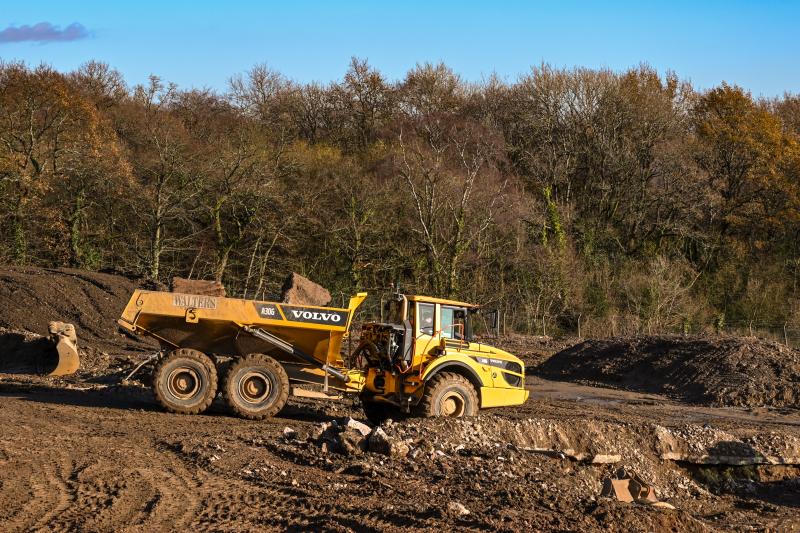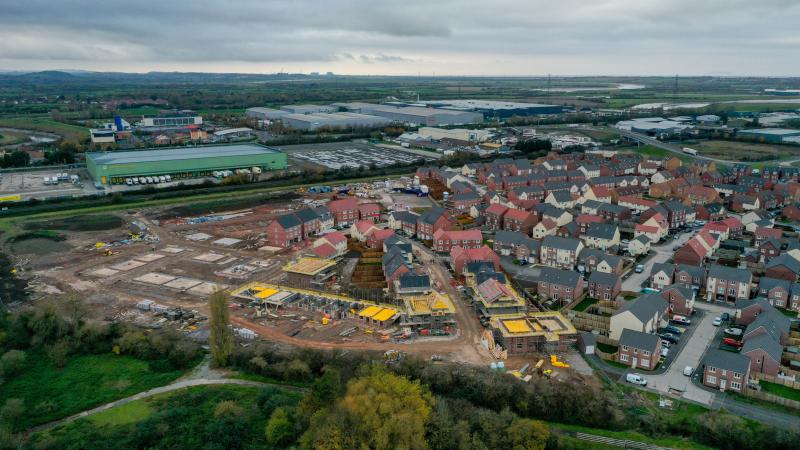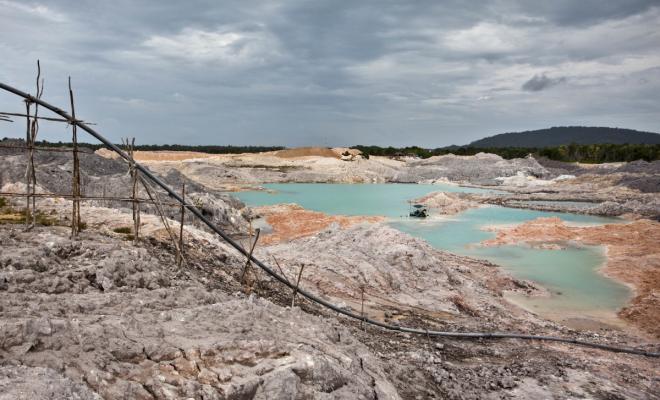Kierra Box02 Feb 2023
Alongside the climate emergency that we see unfolding before our eyes – with flooding, heatwaves, droughts and wildfires across the globe – there's also a nature emergency. Although it might generate fewer headlines, the destruction of nature is insidiously weakening the life-support systems we need to survive. We can no longer take for granted the ecosystem services that nature provides, such as fresh water, healthy soils and bountiful crops.
If we want future generations to survive and thrive, we need to restore nature and halt its continued destruction. This is the real-world context for the reckless and dangerous attacks on nature protections that the government laid out in autumn 2022.
Together, the Retained EU Law (Revocation and Reform) Bill and proposals for a raft of measures to weaken planning protection looked likely to put pay to the chances of meeting legally-binding climate and nature targets, create uncertainty for vulnerable businesses, shatter the long-term sustainability of our economy and unleash environmental losses that could reduce quality of life for millions of people.
Coupled with a potential rowing back on support systems for agriculture and land, they also marked a radical departure from the manifesto commitment to “the most ambitious environmental programme on Earth”, under which the Conservative government was elected.
Since we initially raised the alarm about this attack on the rules that protect people and nature, some parts of the government’s proposals have been watered down. But the threat hasn’t disappeared.
Undermining nature protections
There are 4 main aspects to these short-sighted and misconceived plans.
1. A bonfire of EU safeguards
Many of the UK’s most important nature protections have their roots in decisions made via the EU. The decisions of EU courts have also helped communities in the UK uphold environmental protections. Friends of the Earth campaigned against Brexit. We not only thought that pan-European decision making on environmental issues made sense given nature and pollution don’t respect borders, but we were also fearful that hard-won nature safeguards might be abandoned. Brexit campaigners said this wouldn’t happen, yet in September 2022 the government published a new law making all EU laws defunct at the end of 2023, unless ministers explicitly choose to safeguard them.
When the Retained EU Law Bill was debated by MPs in January 2023, Labour MP Alex Sobel described the bill as a bonfire of the protections we need “in order to breathe clean air, drink clean water and ensure that our countryside is not ravaged.” And Conservative MP David Davis called the bill not only “not democratic, but it will also be inefficient and possibly incompetent."
If it becomes law without being changed, the bill will give Ministers sole power over the choice of what laws to keep, change or delete – riding roughshod over our parliamentary democracy system and despite Brexit claims that parliament would decide. Scope for proper parliamentary engagement with and scrutiny of changes will be very limited. There's a very high chance that protections will fall through the gaps or that errors will be introduced.
2. Bulldozing planning rules
Some developers and politicians (particularly from the right) have long complained that planning rules that protect nature hold back economic growth and delay infrastructure projects. They also bemoan the role of local democracy in planning.
These existing planning rules face significant and potentially damaging change in 2023. The Levelling-up and Regeneration Bill (LURB) looks to replace stringent but imperfect nature assessment rules with potentially less robust outcomes-based assessments. And while plans to accelerate the development of Nationally Significant Infrastructure Projects (NSIPs) and sweep away planning rules in so-called Investment Zones may have lost impetus under Rishi Sunak’s leadership, we’re yet to see what proposals may replace them.
Such changes risk concreting the countryside, making it harder for people to access nature and more difficult to create a healthy environment for everyone.
3. Backtracking on changes to farming
Much of the farming in the UK is intensive, which is harmful to nature and pollutes our waterways. When Michael Gove was Secretary of State for the Department for Environment, Food and Rural Affairs (Defra), he promised to fundamentally change the way farming is subsidised, from payment according to the size of land towards payment for the “public goods” farming can provide (for example, improvements to soil quality, carbon capture and wildlife support).
Environmentalists and nature-friendly farmers alike welcomed the shift to this welcome revolution in approach. But following long delays in implementation, within days of the Truss government being formed, rumours abounded that the changes were going to be scrapped. It took until January 2023 for the Government to confirm that the scheme would go ahead, albeit with little of the additional detail farmers had requested. The uncertainty caused by these rumours was damaging to farmers and has cut confidence in planning for a more nature-friendly future.
4. Curtailing legal challenges
As well as seeking to undermine the democratic Local Plan process with the addition of National Development Management Policies (NDMPs) that take precedence over Local Plans, and seeking to weaken democratic input into planning decisions for NSIPs, the government also wants to reduce the ability of groups like Friends of the Earth to challenge bad decisions in the courts (for example, by sweeping away important EU case law). These changes are shocking from a government that proclaims internationally that it’s standing up for the values of democracy and the rule of law.
Damaging impacts of weakening environmental laws
Laws that protect the bedrock of our environment – air and water quality, soil health, wildlife and heritage – mustn't be weakened. Doing so could hasten the torrent of pollution that blights our rivers and streams and increase the damaging presence of pesticides across a range of habitats. It could lead to the loss of green spaces and heritage assets that are precious to communities and important for people’s mental and physical health and wellbeing. It could further pollute the air we breathe, with consequences for public health and costs to the NHS. And the consequences for wildlife could mean the loss of species and habitats.
But in December 2022, when government confirmed new environmental improvement targets (already widely criticised as weak during earlier consultation in the spring), it was revealed some had been downgraded before they even came into law. Decisions to remove many rules around Genetically Modified food and allow emergency authorisations for banned pesticides followed. And political debates continue about if and how our habitats protection rules might be weakened to promote more building.
Read on to find out how the government's proposed changes to various legislation and policy areas would make it ever easier to trash nature laws and ever harder to uphold our rights to a healthy environment.
Retained EU Law (Revocation and Reform) Bill
On EU exit day, all EU law that applied to the UK was categorised as "retained EU law" (REUL), including regulations and decisions that previously sat at an EU level and UK laws that were passed to implement EU requirements. Decisions made by EU courts continued to guide the operation of UK courts at all but the highest level. Safeguards were put in place to ensure these laws couldn’t be changed without proper parliamentary oversight and public consultation. However, the government is keen to show some "Brexit benefit" through deregulation and to make some visible policy moves away from the EU.
No one – including the government – is completely certain how many laws will need to be reviewed this year. But current estimates have reached nearly 4,000 protections, covering everything from safeguards for threatened species to safety laws for food and guarantees of our rights at work.
Cumulative threat to protections and access to justice
In 2022 the government passed the Judicial Review and Courts Act, which limited available remedies in Judicial Review claims. The now defunct (but likely to reappear in a new guise) Bill of Rights Bill looked to move the UK’s legal systems away from European Convention on Human Rights (ECHR) case law. And the Public Order Bill was introduced to curtail the right to protest. The REUL Bill allows courts to move further away from existing legal precedents while also introducing the potential for massive legislative change. Together, these moves create potential for re-litigation, legal uncertainty for campaigners hoping to build on previous victories and a substantial barrier to upholding protections for people and nature in the future.
Key REUL bill threats
- It sets a "sunset" date of 31 December 2023 for everything defined as retained EU law. By this date, each part of government must've decided if each law in its purview should be kept as it is, changed in some way or scrapped. If a law is overlooked, it'll be automatically scrapped. This could leave holes in our nature laws that aren't noticed until it's too late.
- It gives government a very broad power to change retained EU law. This includes options to "update", "reduce burdens" and even to "revoke […] and make such alternative provision as […] appropriate". While some scrutiny mechanisms are outlined, it'll be very easy for this government, and future governments, to entirely rewrite or undermine protections for people and nature with only limited debate.
- It allows the courts to depart further from EU case law and abolishes the remaining general principles of EU law. This'll increase legal uncertainty and make it harder for communities to fight for environmental justice.
-
Defra is already underfunded and overstretched. This is going to be a huge amount of work for Defra, which has already identified nearly 2,000 laws to review and may find more. It'll have knock-on effects as funding, capacity and focus are switched from other priorities. Depending on the level of replacement/ revocation planned, we may see a glut of new, lower-quality regulations following this cut-off. Other government departments including transport and business also have huge projected workloads.
We’ve written previously about EU nature protections and how Brexit threatened them – most of these issues are equally relevant now. For example, there are a number of EU-rooted laws relevant to fracking (ie water quality, protected natural sites etc), the removal of which would cause great concern to those who campaigned against this destructive industry.
Planning and Infrastructure
Weakening Environmental Impact Assessment (EIA)
Although civil society and local authorities want to see much stronger alignment of planning policies and decisions with climate and nature restoration targets, the Levelling-up and Regeneration Bill (LURB) currently making its way through parliament will do nothing to achieve this.
The LURB would weaken proper scrutiny by enabling the government to replace the rules for EIA with a system based on Environmental Outcomes Reports (EOR). There's no guarantee that this'd maintain even existing levels of assessment of direct, indirect or cumulative impacts on issues such as biodiversity, climate, air and land from specific types of major development.
Overriding community decision making and the threat to national laws
The Growth Plan, announced under Liz Truss in autumn 2022, included proposals for an acceleration of Development Consent Order (DCO) timeframes, meaning more road schemes and oil and gas infrastructure could be delivered at a quicker pace, and 'Investment Zones’, which were planned to:
-
Disapply a range of legal requirements for businesses and developers.
-
Make it faster for new developments to get planning permissions.
-
Remove or reduce consultations with statutory consultees.
-
Relax consideration of key national and local policies, in certain areas.
This would have threatened existing opportunities for public participation in the planning system, allowed businesses to avoid legal protections around public health and the environment; and took aim at crucial environmental protections, including the Habitats Regulations. We do not believe there is any evidence that public participation is slowing down nationally significant forms of development.
There has been no news on the fate of the Growth Plan since the start of 2023. But is no news really good news? We don't know if a new scheme - replicating Investment Zones to a greater or lesser extent - is on the horizon, nor if a ‘Growth Plan version 2’ might be in development. The LURB still includes measures that could see new NDMPs (for which detail has only just become available in the NPPF consultation) override policies within Local Plans. The latter are democratically drawn up by local authorities in consultation with their communities. And together, the LURB and the REUL bill provide the perfect basis to launch these attacks on sensible protections again. Habitats Regulations and EIA regimes – though far from perfect – have been fundamental in protecting nature sites and ensuring proper consideration of the environmental impacts of proposed development. There's no evidence that they're a barrier to good-quality development.
EIA and Appropriate Assessment (AA)
Having to formulate and submit either an AA (also known as a Habitats Regulations Assessment) and/or an Environmental Statement – usually backed up by a suite of expert ecological, landscape, hydrogeological, highways, archaeological and other specialist reports – alongside a planning application, might in some instances be described as “burdensome”. However, Liz Truss's administration suggested that they “create paperwork and stall development but do not necessarily protect the environment” - which is simply untrue. The reality is that both EIA and AA processes are tangible elements of transcribed EU legislation that protect threatened and rare flora, fauna and geological features – as well as unprotected features – against dirty, polluting and potentially impactful developments that might otherwise have unacceptable or significant effects on them.
The government’s alternative proposal, at least for EIA, is to instead focus on environmental outcomes. It remains unclear whether large NSIP applications would still need to evaluate their potential for having a significant effect on land, sea, water, air and even climate through their location or type/characteristics of impact, as well as in combination with other similar developments (as per existing NSIP EIA regulations).
Of course, while it takes time to gather evidence to support both AA and EIA submissions, how else can developers and/or decision makers gauge the true potential for development impacts on protected nature sites and species and the wider environment if such robust requirements are ditched?
Environmental Land Management Scheme
In late September 2022 Defra rushed to quash news stories that its new Environmental Land Management Scheme (ELMS) farming policy to replace the EU Common Agricultural Policy (CAP) was being halted. But formal confirmation the scheme would proceed did not appear until the New Year, and details are still scarce.
Anti-ELMS interests are using the nexus of Putin’s war, food and energy security fears and the cost-of-living crisis as excuses to revert to their preferred policies, including even more intensive use of land to secure food production in the UK. It's too early to tell how they might impact when – or if – ELMS reaches its full potential. These interests have never been in favour of changing subsidies to support nature, action to reduce the use of pesticides or meeting standards such as the Water Framework Directive.
CAP and ELMS
Despite its green and funding flaws, UK farmers and landowners came to depend on CAP for the taxpayer funds they received. Because payments were linked to the amount of land farmed and the volume of food and crop production, CAP favoured farms with large amounts of land under intensive production, even though this is a leading driver of species and habitat decline.
The introduction of low- and high-tier Environmental Stewardship (ES) allowed CAP to reward farmers and landowners for some environmental actions, but ES was always a minor part (15%) of the overall package. Attempts to allow farmers to be rewarded even more for nature-friendly actions were blocked by the National Farmers' Union.
Government designed ELMS – its post-Brexit replacement of CAP – in recognition of CAP’s severe flaws and the need for the UK, which is 70% farmland, to see subsidies to farmers and landowners doing much more than the marginal ES schemes under CAP.
ELMS means a switch to a system that, for the first time, focuses on how farmers and landowners can play a full role in helping to reverse the poor state of nature in the UK, driven largely by intensive practices denuding soil and water quality and hastening the decline of diverse habitats and species, even when these are fundamental to healthy farming and land management.
Switching to a new system is bound to cause uncertainty and the mess over previous delays in payments to farmers lingers in the mind. But the overall direction from direct payment for production to "public money for public goods" such as cleaner rivers and more and better nature, as well as better farmland conditions, is a good move – for farmers to play their part, for environmental gains and for better use of public funds.
Making more of the money should also result in fewer extra funds being needed for remedial action such as water clean-up. That's why for some time we've proposed that recipients who do the right thing deserve much more financial support.
ELMS isn't a policy in isolation – how it works will directly relate to and have a bearing on other aims such as the Habitats Regulations (see below), and to government policies including on nature's recovery, on the Sustainable Faming Incentive (SFI) and on post-Brexit regulations on pesticides and chemicals.
Habitats Regulations
Nature in the UK is in trouble. Three out of 5 wild species are in long-term decline. Yet the UK government still wants to scrap our most vital nature laws – the Habitats Regulations.
The Birds and Habitats Directives are the most critical legal backstop for the most important wildlife, natural habitats and landscapes. Ironically, the UK championed the nature laws as a member of the EU. And during and since the 2016 Brexit referendum, voters were told that the UK leaving the EU would see it match or better EU standards.
A third attempt to scrap nature protection laws
The government has rightly set legal targets in the Environment Act 2021 to reverse the decline of wild species by 2030 – just a few years away. But it has form in trying to scrap the nature laws needed to meet them. Despite originally championing the protections, everything changed after 2010. The latest moves to ditch or rewrite them, through the LURB and the review of Retained EU Law, is the UK’s third attempt in a decade to scupper these nature protections.
First, George Osborne claimed that nature laws block economic progress, but a review by the government itself (Defra) found his claim was unfounded. In response to the UK government’s second attempt a few years later, over 100,000 people from across the UK responded to a review of the laws by saying that the only problem with them was the government failing to observe and implement them properly.
Crucially, the government has failed to show how it would replace the nature laws with something that's truly better, whether in bureaucratic terms or for habitat, species and landscape protection and recovery. Meddling with the laws seems to be a case of returning to unfinished business to satisfy some narrow vested interests. But by doing so the government is wasting time if it really wants to get on track to hit its own targets, targets which it's recognised are needed to restore nature in the UK.
Why would a government that says it's serious about being the first to leave our environment in better condition within a generation, waste time scrapping the most important legal backstop it has at its disposal to make that pledge come true?
England only but with UK consequences
Lastly, because nature and environment issues are devolved in the UK, this threat to nature would only apply in England. Even so, weakening the nature laws in England alone will still harm nature UK-wide, if only because many species migrate. The UK’s post-Brexit commitments to international nature depend on retaining the Habitats Regulations, eg the Ramsar Convention on Wetlands and the Bern Convention’s "Emerald" habitats, which replace EU Natura 2000 sites.
If the nature laws are weakened or scrapped in England, the entire UK’s claimed reputation to lead the world on protecting and restoring nature will be undermined.
A challenge to the government
An unprecedented group of environmental organisations, including Friends of the Earth, came together to challenge the government over this attack on nature outlined in autumn 2022. And we’re pleased that some of these plans to deregulate appear to have fallen by the wayside. But the threat hasn’t gone away. Plans to review Retained EU Law, moves to change our planning system, and pressure to weaken nature protections are both a present and future danger. And government must radically rethink.
We say that, while reasonable and positive reform can be achieved, it must be based on careful consideration and grounded in evidence and consultation. Support for existing UK environmental standards and protections is resolutely high in constituencies up and down the country, so any changes must be based on clear proposals for change and evidence of what they'll deliver. It'd be utterly self-defeating to set world-leading targets for nature while sweeping away the regulations needed to achieve them.









